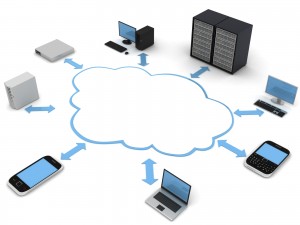Telefónica Public Policy & Telefónica España Regulatory teams
“Cloud computing, cloud computing, cloud computing …” the two magic words that have had Brussels buzzing over the past few months. We have witnessed policy makers’ madness on the issue as a new world was being discovered.
Sorry, but cloud computing isn’t new…
For many years we’ve been using many cloud-based services such as webmail, we were just not conscious of it. Gmail, Flickr and other services using remote storage and processing have been a part of the digital experience for a long time. So, a new regulation is not needed; rather, the existing ones should be updated to take cloud into account. In order to foster cloud computing, regulators must simplify legislation. Current data protection rules have been implemented differently in every EU Member State. Pan-European companies have to deal with a patchwork of 27 different implementations that create additional cost and uncertainty. Rules cannot become a barrier to innovation and have to be flexible enough to act as an incentive to the development of new data mobility services.
Many factors have contributed to making this topic current. First, there is the economic crisis. According to estimates by different studies, the generalized use of cloud computing could increase GDP by 0.2%, save 700 billion euros over the next 5 years, create 2.4 million jobs in the EU and also improve energy consumption as well as reduce CO2 emissions.
The second factor has been the explosion in the use of cloud computing services in everyday life such as, Facebook, Spotify and Dropbox that have caused issues such as data protection to surface.
The Digital Internal Market is a goal worth achieving, and reducing legislation is an important path to be followed. Existing general rules on data and consumer protection should apply to all players. Consumers will fully embrace cloud computing once they are sure that their data is protected in the same way across the Internet and the Cloud. On the technical level, interoperability must become a priority.
Digital Trust and Confidence is the main argument in implementing a single market. In order to create a common framework, the keywords for stakeholders must be compliance, transparency trust and accountability.
Ensuring a competitive market is the best way for companies to provide quality cloud computing services that meet users’ expectations and needs. Being able to offer different levels of privacy and control for users gives the necessary flexibility without stifling innovation
We have to do away with the piecemeal approach on data transfer and strive for a global approach. Current regulation does not meet the current needs of multinational companies. For example, international intra-group data transfer procedure rules must be revised in order to ensure competitiveness and lower costs.
Finally, there is an aspect that is often overlooked: network infrastructure. A Cloud Computing strategy must be supported by an infrastructure strategy. The ambitious network investments as required by the Digital Agenda goals are estimated by the European Commission at 300 billion euro. Incentives and a more proportionate and targeted regulatory environment are required in order to achieve these goals.
For Telefónica, cloud computing is not a promise but a reality. 3GBox is the first 3G USB modem with unlimited storage capacity based on cloud computing technology. The device has a 3G connection that allows users to download and upload content easily and safely. If the device is lost, uploaded data to the web will remain safe. This innovative and attractive service is what the Cloud enables.
Luis Planas Herrera is stagiaire in Public and Regulatory Affairs at Telefónica’s office in Brussels








